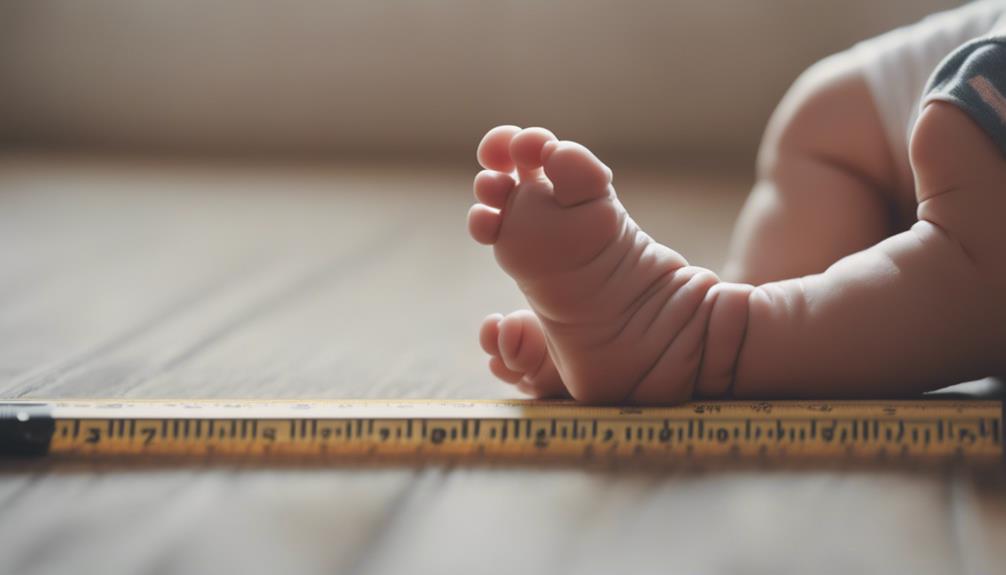It is essential to monitor your baby’s physical milestones to track their development and ensure they achieve key milestones on time. Keep an eye out for activities such as rolling over, sitting up, crawling, and walking to evaluate progress. Detecting delays early allows for timely intervention. Be vigilant and communicate any worries with your pediatrician. Encourage healthy physical growth by incorporating regular tummy time and creating a stimulating home environment. Utilize resources like the CDC’s Milestone Tracker App for milestone checklists in various languages. Taking a proactive stance in monitoring these milestones is crucial for promoting your baby’s growth and development.
Key Takeaways
- Observe rolling over, sitting up, crawling, and walking for developmental progress.
- Address developmental delays by consulting pediatrician promptly.
- Encourage tummy time for healthy physical development and milestone achievements.
- Utilize CDC's Milestone Tracker App for effective milestone monitoring.
- Create a safe and stimulating environment at home to promote growth.
Importance of Milestone Tracking
Tracking your baby's physical milestones is essential for monitoring their growth and development. By keeping an eye on developmental milestones, you're ensuring that your baby is on track with their baby's developmental progress.
These milestones to track include skills that babies typically acquire at certain ages, such as language development, motor skills, and social abilities. Milestone tracking not only allows you to celebrate your baby's achievements but also helps in early intervention if any delays are noticed.
It serves as a valuable tool for developmental screening, providing a clear picture of your baby's developmental journey. By staying vigilant and tracking these milestones, you can collaborate with healthcare providers to address any concerns promptly.
Recognizing Physical Milestones
To recognize physical milestones in your baby, observe key activities like rolling over, sitting up, crawling, and walking. These milestones are important indicators of your child's developmental progress and motor skills. Tracking your child's physical milestones at each age helps you understand their development better.
Early identification of milestones allows you to address any concerns promptly. Noticing when your baby achieves these milestones gives you insight into their growth and overall well-being. As your child progresses through each stage, celebrate their achievements and encourage their continued development.
If you have any worries about your child's physical milestones, discussing them with your pediatrician can provide you with the necessary guidance and support. Remember, every child develops at their own pace, but tracking these milestones is an essential part of monitoring your child's development.
Stay attentive and engaged in your child's physical milestones to make sure they're on the right track.
Addressing Developmental Delays
If you notice any differences in your baby's movement from their peers or a regression in their skills, it may be important to address potential developmental delays. Developmental delays in a child's physical milestones like rolling over, sitting, and walking can be concerning. Keep track of your child's developmental progress and consult with a pediatrician if you have any worries. It is essential to act early when it comes to addressing developmental delays in young children. Discuss your concerns openly with your healthcare provider, complete developmental screening questionnaires, and explore therapy options if necessary. Remember to take into account your child's corrected age if they were born prematurely. Below is a table to help you understand the importance of addressing developmental delays promptly:
| Benefits of Addressing Developmental Delays | Why Early Intervention Matters |
|---|---|
| Helps your child reach milestones on time | Prevents potential long-term issues |
| Supports your child's overall development | Increases chances of successful outcomes |
Promoting Healthy Physical Development

Encouraging regular tummy time sessions with your baby is key to promoting healthy physical development. Tummy time helps strengthen muscles important for milestones like rolling over, sitting up, and crawling.
By age 2 months, your baby's developmental journey begins, and focusing on physical development is essential. Keep track of your baby's progress using tools like the Milestone Tracker from the Center on Birth Defects.
Learning the signs of healthy physical development is necessary for supporting your children's development. Additionally, creating a safe and stimulating environment at home is critical for your baby's growth.
Regular pediatric check-ups can also aid in monitoring your baby's physical milestones and addressing any concerns that may arise. By being proactive and attentive to your baby's physical development, you can set a strong foundation for their future motor skills and overall well-being.
Utilizing CDC Resources
Explore the CDC resources available to help you monitor your child's developmental milestones effectively.
The Centers for Disease Control (CDC), specifically the National Center on Birth Defects and Developmental Disabilities, offers a valuable tool for parents to track their children's development.
The Milestone Tracker App is a free resource that provides parents with milestone checklists in various languages. These checklists can be completed online or printed for easy tracking of your baby's progress since birth.
While the Milestone Tracker App isn't a replacement for standardized screening tools, it can assist you in staying informed about your child's developmental milestones.
By utilizing this CDC resource, you can actively participate in monitoring your baby's growth and ensuring they're meeting important developmental milestones.
Stay informed, stay engaged, and track every step of your baby's development with the help of the CDC's Milestone Tracker App.
Frequently Asked Questions
How Do You Record Baby Milestones?
To record baby milestones, simply enter your baby's birthdate in the app for accurate alignment. Watch milestone videos for guidance and use the Babys First Year Milestone Guide for reference. Adjust for premature babies too.
How Are Milestones Used to Track Infant Growth?
To track infant growth, observe milestones like motor skills, sensory responses, communication, and feeding abilities. These indicators help monitor progress and detect delays early. Use tools like the Pathways.org app to record and compare your baby's development.
How Do You Capture Baby Milestones?
To capture baby milestones, you document each milestone as your baby achieves them. Use the Pathways.org Baby Milestones app for easy tracking. Order the Babys First Year Milestone Guide for a handheld tool.
What Is the App That Tracks Milestones?
To track milestones, the app you need is the Milestone Tracker App by the CDC. Download it from the App Store or Google Play. Input your child's details for personalized milestone checklists to monitor progress easily.
Conclusion
In summary, tracking your baby's physical milestones is vital for monitoring their development and addressing any potential delays early on.
According to the CDC, 1 in 6 children in the United States have a developmental disability, making milestone tracking essential for early intervention.
By recognizing and promoting healthy physical development, you can guarantee your baby reaches their full potential.
Be sure to utilize the resources provided by the CDC to support your child's growth and well-being.










